|
|
|
|
|
 |
 |
|
| |
Jeux interdits
(Verbotene Spiele | Forbidden Games)
|
|
|
| |
 |
France 1952 - 83 Minuten -
Regie: René Clément
Produzent: Robert Dorfmann
Produktion: Silver Films
Drehbuch: René Clément, Jean Aurenche, Pierre Bost, François Boyer (nach dem Buch Les Jeux Inconnus von François Boyer)
Kamera: Robert Juillard (s/w, 1.37:1 Academy Ratio 35mm)
Schnitt: Roger Dwyre
Musik: Narciso Yepes
Bauten: Paul Bertrand
Ton: Jacques Lebreton (Mono)
Darsteller: Brigitte Fossey (Paulette), Georges Poujouly (Michel Dollé), Lucien Hubert (Le père Dollé), Suzanne Courtal (Madame Dollé) Jacques Marin (Georges Dollé), Laurence Badie (Berthe Dollé), André Wasley (Le père Gouard), Denise Perrone (Jeanne Gouard), Louis Sainteve (Le curé)
Erstaufführung: 9 Mai 1952
Auszeichnungen: Goldener Löwe 1952 Film Festival von Venedig • Best Film – Any Source 1953 British Academy Awards
Literatur: Bazin, André: Jeux interdits. In: Qu'est-ce que le cinéma. Bd. 3: Cinéma et sociologie. Paris 1961. — Garbicz, Adam / Klinowski, Jacek: Cinema, the Magic Vehicle. Bd. 2: The Cinema in the Fifties. New York 1983.
|
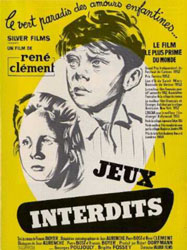
|
|
 International Movie Database International Movie Database |
 All-Movie Guide All-Movie Guide |
|
|
| |
 |
|
| |
Im Juni 1940 haben die deutschen Truppen gerade Paris erreicht. In großen Trecks flüchten viele aufs Land. Bei einem Tieffliegerangriff auf eine Brücke verliert die 5 Jahre alte Paulette ihre Eltern und gerät in ein kleines Dorf, wo sie von der Familie Dollé aufgenommen wird und sich mit dem 11-jährigen Sohn Michel anfreundet. Die Familie lebt ärmlich und befindet sich zudem in einem Generationen währenden Streit mit einem Nachbarn. Die beiden Kinder beschäftigen sich in einer vom Krieg kaum gestörten, aber beeinflussten Umwelt auf ihre Weise. Sie sammeln tote Tiere und richten in einer verlassenen Mühle einen Friedhof für sie ein. Um die Gräber schmücken zu können, muss Michel auf Betreiben von Paulette Kreuze besorgen, wobei er auch nicht davor zurückschreckt, das Grab des eigenen Bruders und den Hochaltar der Dorfkirche zu berauben. Die Jagd auf den unbekannten Störenfried der Dorfgemeinschaft bringt die verfeindeten Familien einander näher. Schließlich wird Michel erwischt und bestraft, während Paulette in ein Heim des Roten Kreuzes kommen soll. Auf der Sammelstelle läuft sie rastlos herum und ruft vergeblich nach ihrem einzigen Freund, Michel.
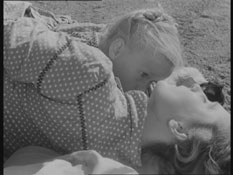 Die Haupthandlung des Films findet in einem Dorf statt, das sich ein wenig wie eine kleine, von undramatischen Konflikten geprägte Idylle präsentiert. Zwei Nachbarn sind im Streit, Michels Bruder liebt die Tochter der anderen Familie, der Pfarrer vermittelt und klärt Missverständnisse auf. Der Krieg scheint keinen großen Einfluss auf den Ablauf des Alltäglichen zu nehmen, bis der kleine Flüchtling Paulette eintrifft. Die Freundschaft, die sie mit Michel schließt, ist geprägt von der Erfahrung des Sterbens im Krieg. Der besondere Charakter dieser Beziehung isoliert die beiden Kinder von der Dorfgemeinschaft, sie spielen in einer eigenen Welt. Paulette erscheint als unbewusst vom Krieg korrumpierter Charakter und ist zugleich ganz unschuldig. Sie verleitet Michel zu den Diebereien und wohl auch zum Töten von Tieren. Der Normalität der Verhaltensweisen im Dorf setzt sie ihre unverarbeiteten Kriegserlebnisse als die ihr natürlich erscheinende Normalität entgegen. Im gegenseitigen Erziehungsprozess lernt Michel, den Krieg in sein Leben zu integrieren: Das Küken hat nicht er getötet, sondern es war "eine Bombe". Paulette lernt die Bedeutung des Kreuzes kennen und Gebete aufsagen. Ihre Beziehung ist aber auch unterschwellig erotisch geprägt. "Du bist nie zufrieden", beklagt sich Michel, wenn sie immer schwieriger zu beschaffende Kreuze von ihm verlangt und ihn durch die kokette Dosierung von Zärtlichkeiten in die Situation eines hörigen Liebhabers bringt. Die Haupthandlung des Films findet in einem Dorf statt, das sich ein wenig wie eine kleine, von undramatischen Konflikten geprägte Idylle präsentiert. Zwei Nachbarn sind im Streit, Michels Bruder liebt die Tochter der anderen Familie, der Pfarrer vermittelt und klärt Missverständnisse auf. Der Krieg scheint keinen großen Einfluss auf den Ablauf des Alltäglichen zu nehmen, bis der kleine Flüchtling Paulette eintrifft. Die Freundschaft, die sie mit Michel schließt, ist geprägt von der Erfahrung des Sterbens im Krieg. Der besondere Charakter dieser Beziehung isoliert die beiden Kinder von der Dorfgemeinschaft, sie spielen in einer eigenen Welt. Paulette erscheint als unbewusst vom Krieg korrumpierter Charakter und ist zugleich ganz unschuldig. Sie verleitet Michel zu den Diebereien und wohl auch zum Töten von Tieren. Der Normalität der Verhaltensweisen im Dorf setzt sie ihre unverarbeiteten Kriegserlebnisse als die ihr natürlich erscheinende Normalität entgegen. Im gegenseitigen Erziehungsprozess lernt Michel, den Krieg in sein Leben zu integrieren: Das Küken hat nicht er getötet, sondern es war "eine Bombe". Paulette lernt die Bedeutung des Kreuzes kennen und Gebete aufsagen. Ihre Beziehung ist aber auch unterschwellig erotisch geprägt. "Du bist nie zufrieden", beklagt sich Michel, wenn sie immer schwieriger zu beschaffende Kreuze von ihm verlangt und ihn durch die kokette Dosierung von Zärtlichkeiten in die Situation eines hörigen Liebhabers bringt.
Diese 'Liebesgeschichte' wird nur auf der Ebene der Intrige mit dem Hauptgeschehen verknüpft, etwa, wenn Dollé den Nachbarn verdächtigt, die Kreuze entwendet zu haben und die beiden im Streit darüber auf dem Friedhof in ein offenes Grab fallen. Die Auflösung dieses Missverständnisses setzt dann aber auch den Versöhnungsprozess in Gang. Dass trotzdem zwei unvereinbare Welten bestehen bleiben, wird am Ende klar, als der Vater unbekümmert sein Versprechen bricht, Paulette dazubehalten, wenn Michel das Versteck preisgebe. Sobald die Ordnung des Friedens sie trennt, ihren eskapistischen Kriegsfreiraum zerstört, werden beide Kinder zu Außenseitern.
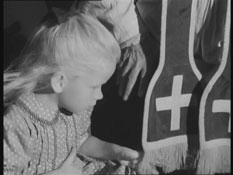 Clément bricht radikal mit einem die ganze Geschichte des Kinderfilms beherrschenden "Manichäismus, in dem das Kind die Kräfte des Guten verkörpert" (Bazin). Diese beiden Kinder sind 'unerziehbar', sie sind selber schon erwachsen, nur nicht in dem Sinn, wie Eltern oder Kinderfilmregisseure sich dies vorstellen, und ihre Geschichte bietet auch keinen Anhaltspunkt dafür, dass sie einmal in solche Vorstellungen 'hineinwachsen' werden. Clément bricht radikal mit einem die ganze Geschichte des Kinderfilms beherrschenden "Manichäismus, in dem das Kind die Kräfte des Guten verkörpert" (Bazin). Diese beiden Kinder sind 'unerziehbar', sie sind selber schon erwachsen, nur nicht in dem Sinn, wie Eltern oder Kinderfilmregisseure sich dies vorstellen, und ihre Geschichte bietet auch keinen Anhaltspunkt dafür, dass sie einmal in solche Vorstellungen 'hineinwachsen' werden.
Dass die Kindermoral sich als ebenbürtig erweist, ist kein Rückweichen auf klassische Filmklischees, sondern ein bewusstes Spiel mit ihnen. Denn letztlich muss auch Clément, angesichts der ungeheuren darstellerischen Leistung, die dieses dramatische Konzept erfordert, auf den 'Unschuldsbonus' zurückgreifen, wenn er es mit Kindern realisieren will. Vielleicht braucht es den blond gelockten Kinderstar, als der Brigitte Fossey hier auftritt, um die 'alternative' Moral dieser Kinderwelt, die die Erwachsenen im Film nicht einmal zur Kenntnis nehmen, wenigstens uns verständlich zu machen.
Günter Giesenfeld, Reclams elektronisches Filmlexikon
T
he youngest member of this leading group of directors, René Clément, produced the most satisfying group of films in the early 1950s. Jeux interdits (1952), a return to the theme of war made from a script by Aurenche and Bost, dealt with the subject obliquely, seeing it through the eyes of two children. After a strikingly edited opening sequence showing the machine-gunning of a column of refugees, the film concentrates on a little Parisian girl whose parents are killed in the attack and on the young peasant boy who befriends her. The film draws us into their secret world, where, away from adult eyes but influenced by the carnage around them, they build a cemetery for dead animals. The adult world is caricatured, but the children are observed with real sympathy and understanding. Clement has drawn from his young players performances of great naturalness and his recreation of their private world and growing Obsession with death is conveyed in masterly fashion through the images and Narcisco Yepes’s sensitive guitar accompaniment.
Roy Armes: French Cinema. New York 1985, p. 153-154
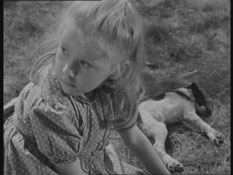 One of the best films ever about war and its effects, FORBIDDEN GAMES also speaks beautifully to the need of children to construct their own fantasy world away from adult supervision. One of the best films ever about war and its effects, FORBIDDEN GAMES also speaks beautifully to the need of children to construct their own fantasy world away from adult supervision.
FORBIDDEN GAMES derives most of its power from Clement's painstakingly methodical direction and the remarkable performances of the two child leads. Poujouly and the amazing five year-old Fossey are highly expressive actors who give this stunning film its emotional core. The visual and narrative style is a potent blend of stark documentary, pastoral realism and film noir. Seeing war through the eyes of children who cope with its atrocities by constructing their own little game of death was a brilliant move—it seems morbid and grotesque to all the adults, but the problem is that they are the ones who really lack understanding and respect.
René Clément’s undisputed masterpiece, Jeux interdits is almost unquestionably the most compelling and intensely poignant drama featuring young children ever filmed. The film retains its power to shock and to drive its audience to tears, fifty years after its first release. Few films possess the purity of expression and haunting poetry which this film sustains from start to finish.
Although it is not directly a film about the abomination of war, Jeux interdits makes a powerful anti-war statement, mainly by showing its effect on impressionable young children. The disturbing way in which the children Michel and Paulette incorporate what little they see of the war into their play not only reveals the corrupting influence of the worst in human activities, but it brings home with startling vividness the true sickening perversity of war. It is as if the children are holding up a flickering candle to show the worst — the absolute worst — in human nature.
Perhaps the most shocking thing about this film is the way in which the behaviour of the children Michel and Paulette is presented as being almost adult. Their "forbidden game" is rendered totally acceptable from their perspective, so that when the animal graveyard is finally revealed, the effect is one of tragic poignancy rather than horror. By contrast, it is the adults who torment the children who appear irrational and menacing. Whilst Michel and Paulette conduct themselves with dignity and act from what appear to be the purest of motives, their parents and their neighbours bully, deceive, threaten and fight. The children create a world of unparalleled beauty and purity whilst the adults around them ruin their world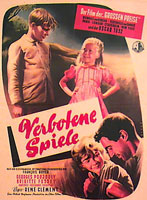 with their lies and their petty differences. Notice that it is only Paulette who refuses to drink milk from a dirty glass containing a dead fly. The grown-ups appear quite oblivious to the filth they live in. with their lies and their petty differences. Notice that it is only Paulette who refuses to drink milk from a dirty glass containing a dead fly. The grown-ups appear quite oblivious to the filth they live in.
What makes this a truly great film, one which will endure for as long as film archives will, is the quite remarkable performance from the two child actors, Georges Poujouly and Brigitte Fossey. The angelic Fossey is particularly captivating, showing not just great promise as an actress, but possessing a genuine infantine purity which is responsible for much of the film's charm and impact. Fossey's innocence is contrasted superbly with Poujouly's impish mischievousness, and the two actors have a brother-sister rapport which is quite mesmerising to watch. Narciso Yepes' spiritually moving music heightens the effect, making some of the scenes involving the two children very emotionally demanding for an unsuspecting audience.
The making of the Jeux interdits is also quite noteworthy. Originally, its producer, Robert Dorfmann envisaged making a film containing three segments, of which Jeux interdits would form the middle part. He had to abandon the project when, having made the Jeux interdits segment in 1950, the funds dried up. However, Dorfmann was so pleased with this short film that he decided to extend it to a full-length film. The following year, the filming resumed, with the same cast and location, to complete the film. So successful was director René Clément's skill at hiding the fact that the children and location had changed considerably since the first filming that the join is virtually unnoticeable in the final film. Another problem was that the film was cut by 15 minutes to 85 minutes prior to its first release, resulting in an abrupt start and end to the film.
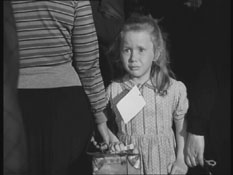 In spite of this, the film was an immediate success throughout the world. Not only was it a box office triumph, receiving favourable reviews from virtually every quarter, but it was showered with awards to an extent which is rare for a European film. It won the Grand Prix Indépendant at Cannes in 1952. the Golden Lion award at Venice in 1952, the Best Foreign Language Film Oscar in 1953, a British Academy Award in 1954, and many others. This immense popularity and deluge of prizes is a genuine reflection of the quality of the film, which is a masterpiece by anyone's standards, but also of its capacity to engage and move its audience, no matter who that audience might be. Jeux interdits has something which appeals to a common humanity, offering a simplistic moral perspective which makes it probably one of the most eloquent and genuine works in the history of cinema. In spite of this, the film was an immediate success throughout the world. Not only was it a box office triumph, receiving favourable reviews from virtually every quarter, but it was showered with awards to an extent which is rare for a European film. It won the Grand Prix Indépendant at Cannes in 1952. the Golden Lion award at Venice in 1952, the Best Foreign Language Film Oscar in 1953, a British Academy Award in 1954, and many others. This immense popularity and deluge of prizes is a genuine reflection of the quality of the film, which is a masterpiece by anyone's standards, but also of its capacity to engage and move its audience, no matter who that audience might be. Jeux interdits has something which appeals to a common humanity, offering a simplistic moral perspective which makes it probably one of the most eloquent and genuine works in the history of cinema.
Forbidden Games is a simple, yet deeply affecting story about loss and the ravages of war. Filmed from the perspective of children, René Clément juxtaposes the innocence of youth with the insight of maturity. The result is a powerful and unrelenting film that operates on a purely visceral level - from the haunting theme to the heartbreaking conclusion. Paulette (Brigitte Fossey), a Parisian girl orphaned during an air raid, retrieves her dead dog from the river, and in the process, gets lost. Michel (Georges Poujouly), a young boy searching for an errant calf, finds her, and takes her home to his family's farm. There is an immediate bond between them, and the children quickly become friends: Paulette, lonely and afraid, and Georges, protective and kind. But the pastoral life proves 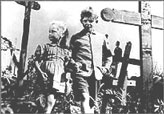 no more idyllic than occupied Paris, and soon, death takes its toll. Imitating the burial ritual of the adults around them, the children build a crude memorial to honor the dead (a theme similarly developed in François Truffaut's The Green Room). It is through their eyes that we cannot see the impossibility of things. It is through our own perspective that we understand the hopelessness of their situation. Forbidden Games is a bittersweet film that shows the devastation of war by touching an emotional cord, without the visual carnage.
Clément uses a narrative style of filming. There are few, if any, cinematic tricks used in the film. The shots are minimalist, direct, and unflinching. Consequently, the film seems journalistic or documentary in style. He presents his visual argument without prejudice, and we, as observers, bring our own life experiences into the analysis of its meaning. The effect is intensely personal, emotionally devastating, and truly unforgettable.
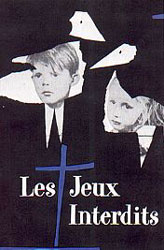 Dans son premier film, La Bataille du rail (1946), René Clément retraçait avec un grand souci d'exactitude documentaire, un glorieux épisode de la Résistance. C'est encore la Seconde Guerre mondiale qui sert d'arrière-plan à Jeux interdits, et plus précisément ces dramatiques journées de juin 1940 qui virent la déroute de l'armée française face à la ruée irrésistible des divisions allemandes et l'exode massif des civils, se précipitant pêle-mêle sur toutes les routes de France et offrant une cible facile aux avions ennemis. Dans son premier film, La Bataille du rail (1946), René Clément retraçait avec un grand souci d'exactitude documentaire, un glorieux épisode de la Résistance. C'est encore la Seconde Guerre mondiale qui sert d'arrière-plan à Jeux interdits, et plus précisément ces dramatiques journées de juin 1940 qui virent la déroute de l'armée française face à la ruée irrésistible des divisions allemandes et l'exode massif des civils, se précipitant pêle-mêle sur toutes les routes de France et offrant une cible facile aux avions ennemis.
La première séquence du film, qui montre le mitraillage d'une colonne de réfugiés par un appareil de la Luftwaffe, rappelle d'ailleurs, par son intensité dramatique, certains moments de La Bataille du rail. Mais le véritable sujet de Jeux interdits n'est ni historique ni politique mais psychologique: en choisissant deux enfants comme personnages principaux, Clément a voulu montrer les rapports existant entre leur univers innocent et vulnérable et le monde cruel et hypocrite des adultes. En dépit du réalisme avec lequel elle est décrite, la guerre n'est qu'un argument narratif qui sert de catalyseur à l'action et qui pourrait à la limite être remplacée par toute autre situation de crise.
De toute évidence, les deux enfants de Jeux interdits sont d'ailleurs incapables d'entrevoir la signification d'événements qui les dépassent. La mort elle-même n'a guère de sens pour eux. Se blotissant contre les corps sans vie de ses parents, la petite Paulette ne réalise pas qu'elle les a perdus à jamais et c'est la stupeur qui l'accable plus que le chagrin. Michel lui-même, pourtant plus âgé et déjà aguerri au contact des dures réalités paysannes, est tout aussi ignorant qu'elle des mystères de la mort: devant le cadavre de son frère, il se montre gauchement embarrassé et cherche à échapper aux responsabilités qui l'attendent en se réfugiant dans les rituels enfantins.
Lorsque Michel et Paulette entreprennent la construction de leur cimetière d'animaux — dans le dessein de donner des compagnons au petit chien de la fillette — , ils ne font que transposer naïvement, dans leur propre univers, le cérémonial qu'ils ont vu accomplir aux "grands". Et le vol des croix, où les adultes voient une intention sacrilège et blasphématoire, leur apparaît tout naturel. Ne vivent-ils pas dans un monde où des adultes, du haut de leurs avions, jettent des bombes sur d'autres adultes. Aussi Michel, les imitant, lance son porte-plume sur un insecte.
Si Clément a peint avec un certain bonheur cet univers enfantin, ses intentions paraissent parfois appuyées en ce qui concerne les lourdes reponsabilités des adultes. Lors d'une interview, il a d'ailleurs déclaré qu'il avait cherché, dans Jeux interdits, à illustrer certains aspects du déterminisme social, afin que nul n'oublie la valeur exemplaire de nos actions aux yeux des enfants qui nous observent.
S'il a assez bien montré cette amoralité foncière des enfants, Clément a malheureusement fait preuve d'un certain manichéisme dans sa mise en accusation du monde des adultes. Les paysans qu'il met en scène sont plutôt caricaturaux. Ce manque de subtilité dans l'ironie est notamment sensible dans la scène où Dollé, le père de Michel, et son voisin Gouard en viennent aux mains dans le cimetière en s'accusant réciproquement d'impiété. On peut regretter aussi le ton parfois larmoyant et mélodramatique de certaines scènes, où Clément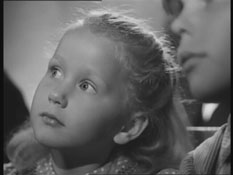 cherche visiblement à attendrir le spectateur en misant sur la frimousse angélique et irrésistible de sa petite interprète Brigitte Fossey. La dernière séquence, cependant, est très émouvante: tandis que la petite Paulette, confiée à la Croix Rouge par les parents de Michel, attend au milieu de la foule qu'on la dirige vers quelque foyer d'orphelins, elle entend soudain appeler "Michel"; cherchant vainement autour d'elle son petit camarade, elle réalise soudain qu'elle a non seulement perdu son seul ami, mais aussi et surtout ses parents et son foyer et elle appelle désespérément sa mère... cherche visiblement à attendrir le spectateur en misant sur la frimousse angélique et irrésistible de sa petite interprète Brigitte Fossey. La dernière séquence, cependant, est très émouvante: tandis que la petite Paulette, confiée à la Croix Rouge par les parents de Michel, attend au milieu de la foule qu'on la dirige vers quelque foyer d'orphelins, elle entend soudain appeler "Michel"; cherchant vainement autour d'elle son petit camarade, elle réalise soudain qu'elle a non seulement perdu son seul ami, mais aussi et surtout ses parents et son foyer et elle appelle désespérément sa mère...
Jeux interdits a certes bien mal vieilli aujourd'hui, surtout par la naïve prétention de son "message sociologique". Néanmoins le film conserve un charme indéniable, qui tient à sa vision gracieuse et juste de l'innocence enfantine. Un charme qui tient surtout au jeu excellent des deux petits interprètes, Brigitte Fossey et Georges Pouloujy. Rien d'étonnant donc à ce que le public de l'époque lui ait fait un véritable triomphe. Ce sera le plus grand succès de René Clément. Un succès auquel il faut associer la très célèbre partition de Narciso Yepes, devenue un classique de la musique de film.
Le Cinéma français. 1930-1960
sous la direction de Philippe de Comes et Michel Marmin
avec la collaboration de Michèle Caillot et Raymond Chirat
Paris: Editions Atlas, 1984, pp. 116-117
|
| |
 |
| |
|
|
|
| |
 |
DVD
|
Film Office / Canal+ Image
Collection Les grands classiques
|
| Länge: |
80:48 min (= 83 min PAL) |
| Video: |
|
| Bitrate: |
|
| Audio: |
- Français Dolby Digital 1.0 Mono
|
| Untertitel: |
|
| Features: |
- Production Notes: A propos du film
- Filmographies
|
| DVD-VÖ: |
8 Juli 1999 |
|
Keep Case
Chapter stops: 24
DVD Encoding: PAL Region 2 (France)
SS-SL/DVD-5 |
|
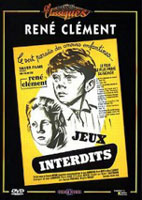 |
|
|
|
|
|
| |
![[filmGremium Home]](../../image/logokl.jpg) |
|
|
![[filmGremium Home]](../../image/logokl.jpg)